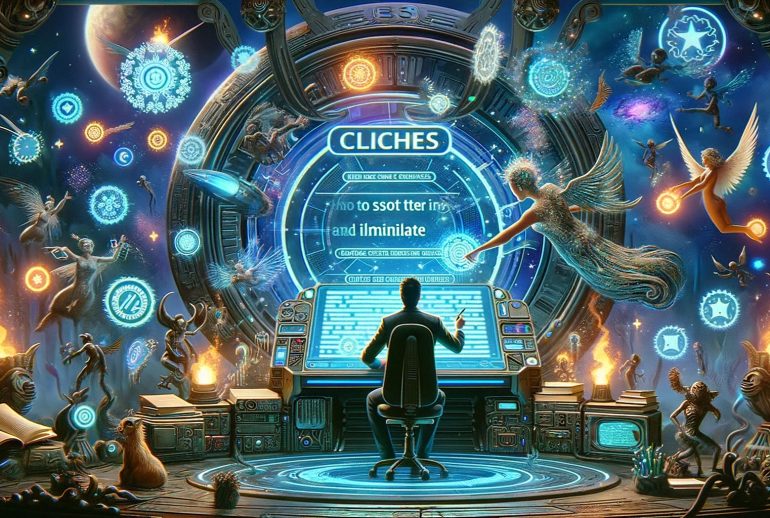Clichés are the bane of creative writing. They are overused, tired expressions, themes, or tropes that have lost their originality and impact. In the world of fiction, clichés can make your work feel stale, unoriginal, and uninspiring. In this comprehensive article, we will explore the concept of clichés in fiction, understand why they can be problematic, and discuss strategies for spotting and eliminating them from your writing to create fresh, engaging, and authentic narratives.
Section 1: Understanding Clichés
1.1. What Are Clichés?
Clichés are phrases, ideas, or elements in storytelling that have been used so frequently that they have become predictable, trite, and uninteresting. They are shortcuts writers take when they lack originality or creativity, often relying on familiar, well-worn concepts.
1.2. Types of Clichés in Fiction
Clichés can manifest in various forms in fiction:
- Character clichés: Stereotypical or one-dimensional characters that conform to well-established archetypes.
- Plot clichés: Overused storylines or predictable narrative arcs.
- Setting clichés: Locations or worlds that adhere to common conventions without unique or innovative features.
- Dialogue clichés: Repetitive or generic dialogue that lacks authenticity and originality.
- Theme clichés: Overexplored themes or messages that fail to offer fresh perspectives.
1.3. The Problem with Clichés
The overuse of clichés in fiction can lead to several issues:
- Lack of originality: Clichés rob your work of its uniqueness and make it blend in with countless others.
- Predictability: Readers can anticipate the outcome or development, diminishing the element of surprise.
- Stale storytelling: Clichés can make your writing feel tired and uninspiring.
- Reduced engagement: When readers encounter clichés, they may disengage emotionally from the story.
- Diminished impact: Clichés can dilute the emotional impact of your narrative.
Section 2: Spotting Clichés in Your Writing
Recognizing clichés in your writing is the first step toward eliminating them. Here are strategies to help you spot clichés in your work:
2.1. Beta Readers and Critique Partners
Engage beta readers or critique partners who can provide fresh perspectives on your writing. They can point out clichés that you might have missed due to familiarity with your work.
2.2. Self-Awareness
Develop self-awareness as a writer. Be mindful of common tropes and phrases that frequently appear in your writing. Analyze your work critically to identify patterns that suggest clichés.
2.3. Comparative Reading
Read widely within and outside your genre. By exposing yourself to diverse storytelling, you can better recognize clichés when they appear in your own writing.
2.4. Writing Groups and Workshops
Participate in writing groups or workshops where members discuss and critique each other’s work. The feedback and insights from fellow writers can help you identify and rectify clichés.
Section 3: Eliminating Clichés from Your Writing
Once you’ve identified clichés in your writing, it’s time to eliminate them. Here are strategies to help you do just that:
3.1. Develop Original Characters
Avoid one-dimensional characters that conform to stereotypes or archetypes. Instead, create complex, multi-dimensional characters with unique traits, backgrounds, and motivations.
Example:
- Cliché: The brooding, mysterious stranger with a dark past.
- Original: A brilliant astrophysicist with a fascination for conspiracy theories.
3.2. Subvert Tropes
Recognize common plot and narrative tropes and subvert them to create fresh and unexpected storytelling.
Example:
- Trope: The hero rescues the damsel in distress.
- Subversion: The “damsel” turns out to be a highly skilled escape artist who outsmarts the hero.
3.3. Reimagine Settings
Challenge conventional settings and world-building by introducing unique elements or perspectives that defy expectations.
Example:
- Conventional: A medieval fantasy world with knights and castles.
- Reimagined: A medieval fantasy world with advanced technology powered by magic crystals.
3.4. Authentic Dialogue
Create authentic and memorable dialogue that reflects the unique voices, personalities, and backgrounds of your characters. Avoid relying on clichéd expressions or responses.
Example:
- Cliché: “It’s not you; it’s me.”
- Authentic: “Our paths have diverged, and I need to find my own way.”
3.5. Explore New Themes
Instead of rehashing well-worn themes, delve into unexplored territory or offer fresh perspectives on familiar themes.
Example:
- Overused Theme: The hero’s journey.
- Fresh Perspective: A story focusing on the hero’s mentor and their struggles.
3.6. Rewrite and Revise
During the revision process, pay close attention to passages that feel clichéd. Rewrite them to infuse originality and authenticity into your narrative.
Section 4: Real-World Examples
Let’s examine how successful authors have managed to avoid clichés and create original, compelling stories:
4.1. “The Night Circus” by Erin Morgenstern
Erin Morgenstern’s “The Night Circus” is a prime example of a novel that defies genre clichés. Instead of a typical battle between good and evil, the story explores a magical competition between two young illusionists, offering a fresh and enchanting take on fantasy.
4.2. “The Road” by Cormac McCarthy
Cormac McCarthy’s “The Road” subverts post-apocalyptic clichés. Rather than focusing on action-packed survival scenarios, McCarthy delves deep into the emotional and moral dilemmas faced by a father and son, providing a harrowing and thought-provoking experience.
Section 5: Conclusion
Clichés in fiction can undermine the originality and impact of your storytelling. By understanding the concept of clichés, spotting them in your writing, and implementing strategies to eliminate them, you can create fresh, engaging, and authentic narratives that resonate with readers. Embrace the challenge of breaking free from clichés and infuse your work with your unique voice and perspective, offering readers a truly memorable and original experience.



